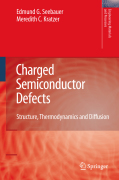
Charged semiconductor defects: structure, thermodynamics and diffusion
Seebauer, E.G.
Kratzer, M.C.
Defects in semiconductors have been studied for many years, in many cases with a view toward controlling their behaviour through various forms of ‘defect engineering’. For example, in the bulk, charging significantly affects the total concentration of defects that are available to mediate phenomena such as solid-state diffusion. Surface defects play an important role in mediating surface mass transport during high temperature processing steps such as epitaxial film deposition, diffusional smoothing in reflow, and nanostructure formation inmemory device fabrication. ‘Charged Defects in Semiconductors’ details the current state of knowledge regarding the properties of the ionized defects that can affect the behaviour of advanced transistors, photo-active devices, catalysts, and sensors. Features: group IV, III-V, and oxide semiconductors; intrinsic and extrinsic defects; and, point defects, as well as defect pairs, complexes and clusters. Details the current state of knowledge regarding the properties of ionized defects in advanced transistors, photo-active devices, catalysts, and sensors INDICE: Introduction.- Fundamentals of Defect Ionization and Transport.- Experimental and Computational Characterization.- Trends in Charged Defect Behavior.- Intrinsic Defects: Structure.- Intrinsic Defects: Ionization Thermodynamics.- Intrinsic Defects: Diffusion.- Extrinsic Defects.
- ISBN: 978-1-84882-058-6
- Editorial: Springer
- Encuadernacion: Cartoné
- Páginas: 335
- Fecha Publicación: 01/01/2009
- Nº Volúmenes: 1
- Idioma: Inglés
